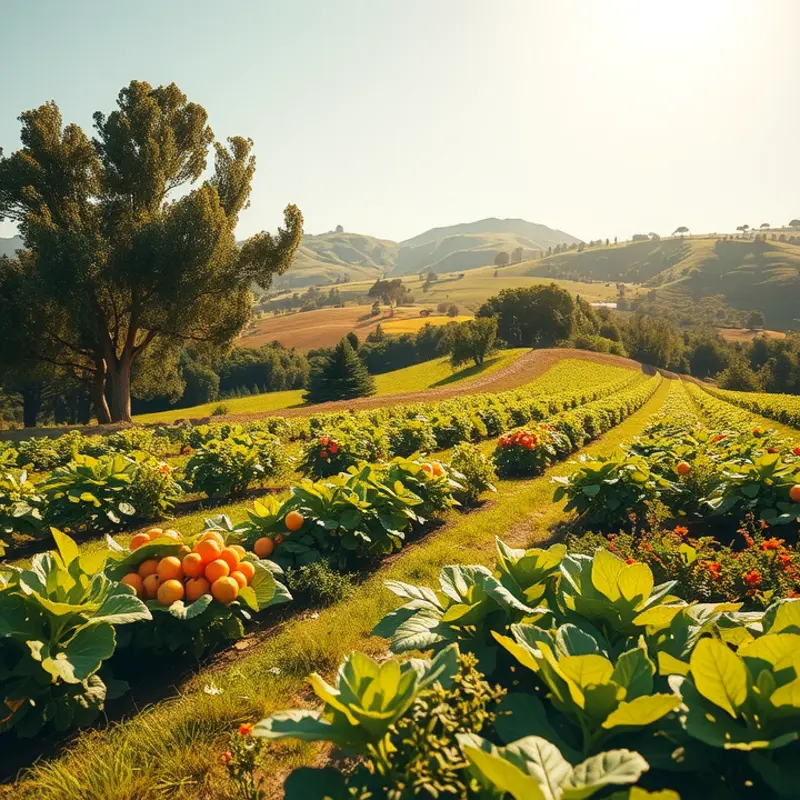As environmental awareness grows, so does the need for responsible sourcing of our food. Herbs, often underestimated in their impact, can play a pivotal role in sustainable food choices. Understanding how to obtain herbs ethically not only preserves our ecosystem but also enhances our culinary experiences. Let’s explore the principles and practices for sourcing herbs that are eco-friendly and socially responsible, paving the way for a greener future while enriching our meals.
Principles of Sustainable Herb Sourcing

The core principles of sustainable herb sourcing are vital for maintaining ecological balance and social justice. They focus on environmental conservation, social responsibility, and local support. These principles help mitigate the negative impacts of large-scale agricultural practices and promote healthier ecosystems.
Environmental Conservation: The cornerstone of sustainable herb sourcing lies in its ecological footprint. Cultivating herbs sustainably involves utilizing organic farming practices that avoid harmful chemicals. This reduces soil degradation and promotes biodiversity. Look for herbs grown with integrated pest management strategies or those certified by environmentally conscious certification bodies. Consider using herbs from brands transparent about their carbon footprint and aiming for carbon neutrality.
Social Responsibility: Ethical herb sourcing also encompasses fair treatment of the labor force. Many herbs are sourced from regions where labor rights are not strictly enforced. Sustainable brands ensure fair wages and safe working conditions for their workers. You can check for certifications like Fair Trade to identify companies committed to these values. Supporting such brands means contributing to a more equitable global economy.
Local Support: Reducing transport miles is another crucial aspect of sustainable sourcing. Herbs sourced locally contribute to lower carbon emissions. Supporting local farmers also helps maintain community economies and reduces reliance on monoculture plantations. Farmers’ markets or local coop shops often provide herbs that ensure these practices.
Actionable Tips:
- Research Brands: Look for brands that provide transparency in their sourcing practices. Websites with sustainability reports or eco-certifications are good indicators.
- Read Labels: Check for eco-friendly and fair-trade labels. Certifications such as USDA Organic or Fair Trade assure certain environmental and social standards.
- Ask Questions: When purchasing from local markets, engage with farmers about their growing practices. This ensures you’re supporting small-scale, sustainable operations.
- Utilize Online Resources: Websites and platforms dedicated to sustainable eating often have directories or lists of recommended brands. One such resource is eco-smart kitchen storage, which offers tips for sustainable choices.
Choosing sustainably sourced herbs aligns culinary practices with environmental stewardship. It requires a conscious effort to shift from convenience-based consumption to one that places the planet and people at its center. By adopting these principles, consumers can play an active role in promoting sustainable agriculture practices. Making informed decisions about where and how your herbs are sourced ensures that your cooking nourishes not just your body but also the world around you.
Smart Choices for Consuming Herbs Ethically

Making ethical choices when consuming herbs involves understanding the journey of each leaf and spice from farm to table. Sourcing from local farmers is a powerful way to ensure that your herbs are fresh while supporting sustainable agricultural practices. Local farms often have smaller ecological footprints, reducing the need for long transport routes that contribute to pollution. To discover local herb sources, start by visiting farmers’ markets or joining community-supported agriculture (CSA) programs that focus on transparency and organic methods.
Considering certified organic options is another step forward in ethical herb consumption. Organic certifications ensure that herbs are grown without synthetic fertilizers or pesticides, protecting both the environment and your health. Although organic products may be slightly more expensive, they contribute immensely towards sustainability by promoting biodiversity and soil fertility.
Fair-trade herbs play a crucial role in global ethical sourcing. By purchasing fair-trade certified herbs, you are supporting farmers and workers with fair wages and working conditions. These practices empower communities and encourage sustainable farming methods worldwide. When shopping, look for fair-trade logos or ask suppliers about their fair-trade policies to stay informed.
For those with a green thumb, growing herbs at home is an excellent way to control your supply of fresh, chemical-free ingredients. Homegrown herbs offer unmatched freshness and flavor, enhancing your culinary experiences while reducing your ecological footprint. With minimal space, even a sunny windowsill can host small pots of basil, mint, or thyme. This not only ensures a steady supply of herbs but also enables you to experiment with flavors directly from your garden.
To ensure your herb choices are smart and eco-friendly, keep the following checklist in mind:
- Local Sourcing: Prioritize buying herbs from local farmers and markets.
- Certified Organic: Choose organically certified herbs to avoid synthetic chemicals.
- Fair-Trade Certified: Look for fair-trade labels to promote ethical labor practices.
- Homegrown Herbs: Cultivate your own herbs to enjoy freshness and control over growing methods.
- Minimal Packaging: Opt for herbs with recyclable or compostable packaging to reduce waste.
By implementing these strategies, you contribute to a more sustainable food system and enjoy the goodness of herbs responsibly.
For further tips on minimizing waste with herb storage, check out this guide on eco-smart kitchen storage. Additionally, keep experimenting in your culinary journey with these mindful practices, aligning your diet with ecological values.
Final words
Sourcing herbs ethically not only benefits our environment but also enriches our meals with fresher and tastier ingredients. As you seek out herbs for your culinary adventures, remember the profound impact your choices can make. By advocating for sustainable and ethical practices, you contribute to a healthier planet and a more vibrant local economy. Embrace the journey of learning and exploration in ethical herb sourcing, knowing that each decision contributes to the legacy of a greener earth. Let’s cultivate a community that embraces eco-consciousness—one herb at a time.








